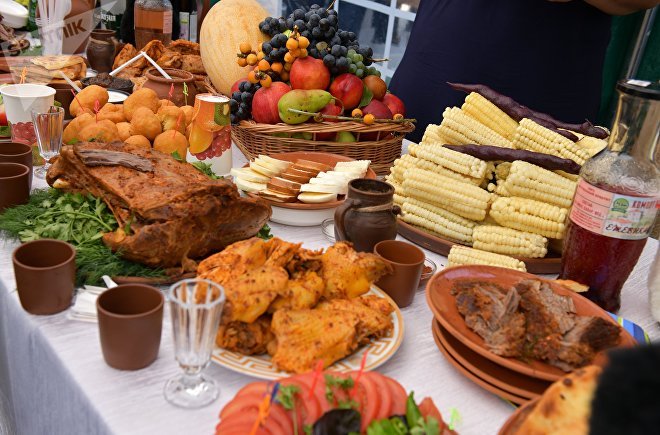Traditions and rituals: the Abkhazian holiday of Nanhwa

To what origins does the Nanhwa holiday in Abkhazia go back? Is it connected with Christian traditions, and what rituals precede it? Read the article.
On 28 August, the memory of the dead is traditionally honoured in Abkhazia. In houses, tables are laid with the fruits of the seasonal harvest, and candles are lit. The tradition also coincides with the Christian feast of the Dormition of the Most Holy Theotokos.
Origins and traditions
According to ethnologist Valery Bigwaa, although the Abkhazian holiday coincides with the Christian one and goes back to it, it is connected with a different approach and other customs. On this day, it is customary in Abkhazian families to remember their deceased relatives.
According to tradition, the head of the family should get up early in the morning and turn to God with a prayer for blessing. A woman starts her day by preparing national food, which will be served at the table.
On the day of the holiday, it is important that there is a newly harvested produce on the table, i.e. everything that has ripened for the owner over the summer.
"They put boiled maize, figs, honey, melon on the table – in other words, everything that ripens at this time. Abkhazian halva is also served, on which only a lighted candle is placed, and while it is burning, it is believed that the spirits of deceased relatives are present in the house. After the table is set, the owners open the doors. While the candle is burning, no-one should talk or leave the room. When the candle goes out, family-members can start eating; the owner raises a glass of young wine and asks God that the all of the next harvest be used only for a good reason," the ethnologist explained.

Celebration of Nanhwa in Abkhazia. Photo by Thomas Thaytsuk.
Bonfire, spirits, fortune-telling
But before sitting down to the table, tasting the new harvest and remembering the deceased relatives, one needs to perform several traditional rituals.
It is believed that on the night of the holiday, all evil spirits come out into the light, evil spirits that walk the streets and bring troubles into homes. In ancient times, to protect oneself from evil spirits, a piece of wax from a candle was attached to the hair, and a homemade circle of tree-branches was hung at the doorstep of the house so as not to allow unwanted guests to enter. According to Esma Todua, a researcher at the ASU’s [Abkhazian State University’s] Centre for Nart Studies and Field-folklore Studies, young people gathered in a company and went to the forest, where they lit a big fire. They themselves hid behind trees and waited for someone to approach it to warm up. The one who was "caught" was considered an evil spirit. So they found out who brought trouble to the house.
In order to expel the spirits, not to let them into the house and thus to prevent trouble, the inhabitants of eastern Abkhazia on the night before the holiday make a fire in front of the house and jump over it. This ritual is called "barbandzhia". It is impossible to translate this word. Todua suggested that the name came from an association with the sounds of flames.
"Usually I throw coriander-seeds or dry fern-leaves into the fire. Before lighting a fire, you need to sprinkle salt around yourself, and then jump over the flames three times. At night, no things should be left at the doorstep of the house, since they can be taken away by evil spirits," said Svetlana Khanagua, a resident of the village of Gup, explaining the traditions of the holiday.
In the western part of Abkhazia, spirits are treated differently. Usually young people after twelve o'clock at night stand at the intersection of three streets and listen the voices that predict their future. Today, on this holiday, girls especially summon spirits to learn about what fate holds for them.
“After twelve at night, you need to sit in a circle and sit in silence; laughing and making any sound are forbidden – you cannot even cough. If in the future there will be a wedding in the house, the spirits will ‘come in’ singing,” said Emma Dzhenia, a resident of the village of Duripsh.
Thus, on 28 August, do Abkhazian families honour the memory of deceased relatives, expel other-worldly influence and ‘greet’ the new harvest.